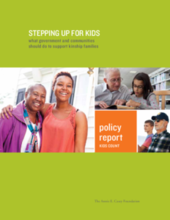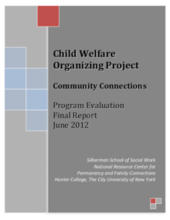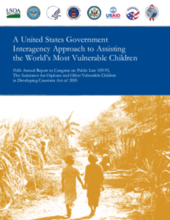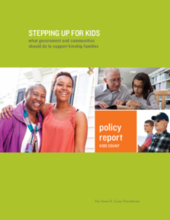Displaying 2081 - 2090 of 2176
This article focuses on a central problem of foster care, which is that it is often not developmentally informed.
This report from the Annie E. Casey Foundation assesses the practice of kinship care within the United States, reflecting upon the widespread use of this care practice, the complexities facing families involved in this form of care and the interventions and supports proven to assist in its success. While specific to the United States, discussions and recommendations can be assessed for application in other global settings.
The study is designed to identify whether effective caregiving mirrors strong parenting among typical parents or whether a set of additional skills is required to parent foster children responsively. Some of the principle features of quality caregiving for children are described particularly in the domains of family integration, relationships with biological parents, and support for children's special needs.
This evaluation study was conducted in an effort to learn more about the innovative parent organizing model implemented by the Child Welfare Organizing Project (CWOP) in East Harlem, New York City and identify the role and impact of CWOP community representatives on birthparents, families, and child safety conference outcomes.
The Fifth Annual Report to Congress on Public Law 109-95, The Assistance for Orphans and Other Vulnerable Children in Developing Countries Act of 2005 highlights continued efforts made by the U.S. Government to improve coordination on behalf of vulnerable children in the past year.
This comprehensive policy report by the Annie E. Casey Foundation summarizes what is known about kinship care in the United States, identifies the problems and issues these families face, and recommends how best to support caregivers as they step up to take responsibility for children in their extended families and communities.
This study used the National Survey of Child and Adolescent Well-being (NSCAW, long term foster care general sample) data set to examine foster child and caregiver characteristics, and the caregiver–child relationship as a predictor of placement stability.
Knowledge transfer is highlighted in this paper as a conceptual framework to understand mandated referral to Early Intervention (EI) services for young children with open child welfare cases.
This paper presents new estimates of the average lifetime cost per child maltreatment (CM) victim in the United States and aggregate lifetime costs for all new cases of CM incurred in 2008 using an incidence-based approach. The authors find that the lifetime economic burden of CM is approximately $124 billion. Given this substantial economic burden, the authors argue that the benefits of prevention will likely outweigh the costs for effective programs.
The Deinstitutionalization Toolkit is designed to provide all those interested in institutional closures and expanded community living opportunities for people with intellectual disabilities and developmental disabilities (ID/DD) with information, strategies, state data, and case studies that can facilitate closure and build community capacity to serve more people with ID/DD in the community. It covers topics such as building a broad-based coalition, understanding and working within the political environment, creating a community system of care, and relevant laws, policies, and court decisions.




